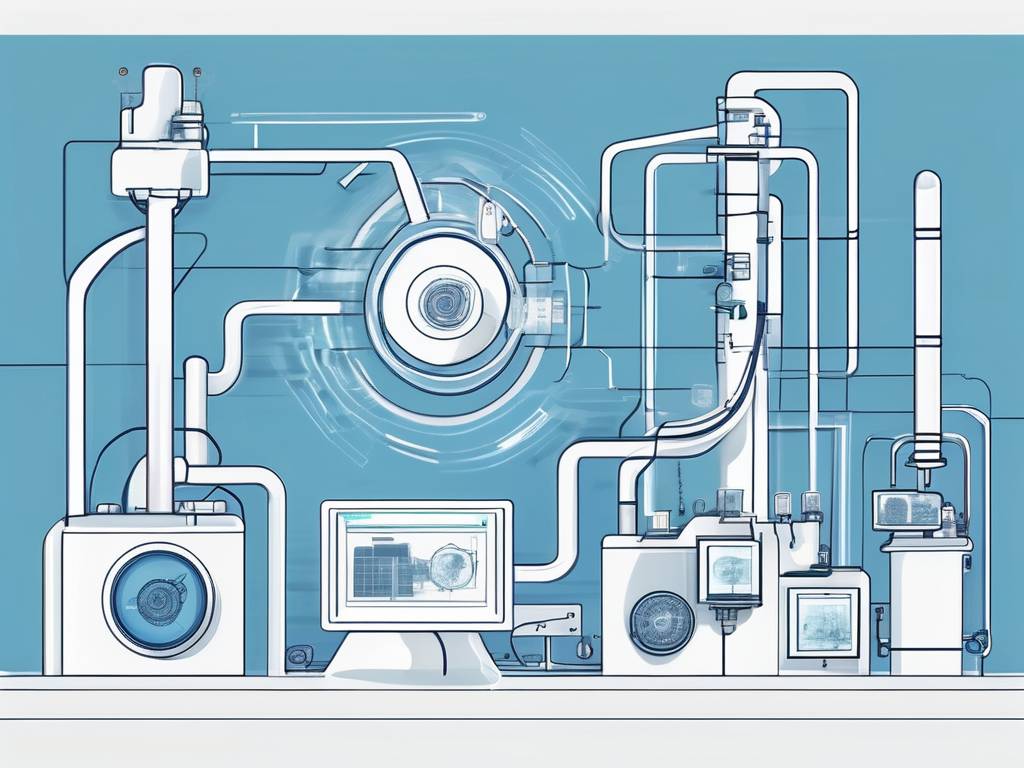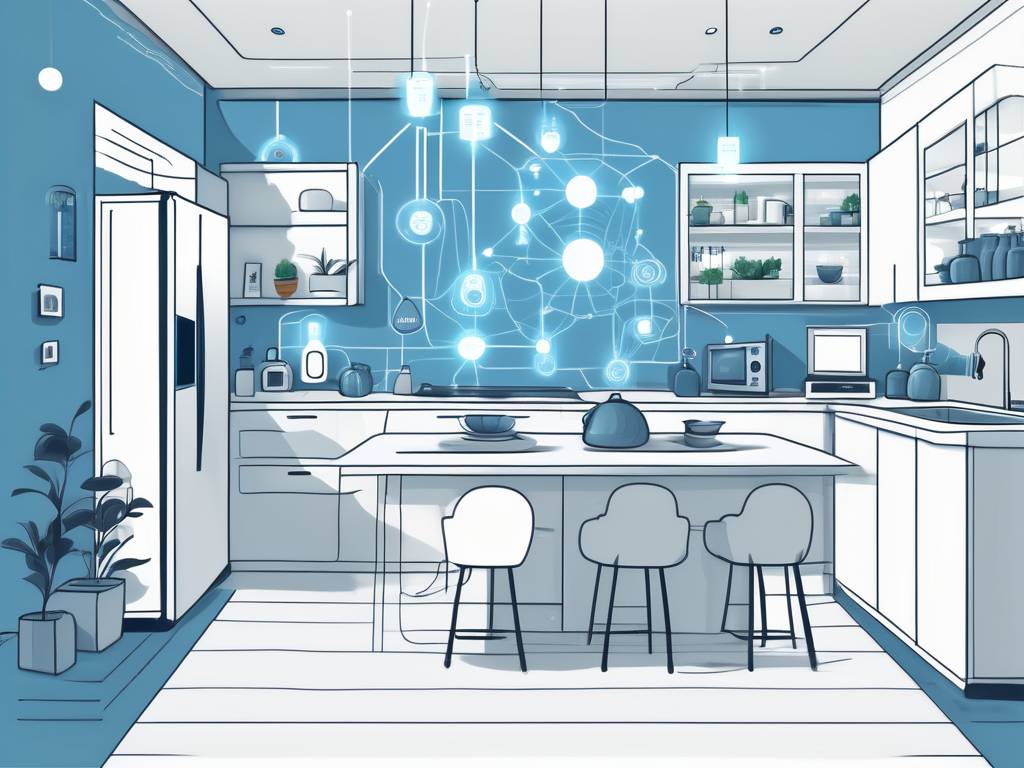IoT Platform: Internet Of Things Explained
The Internet of Things (IoT) is a revolutionary concept that has transformed the way we interact with the world around us. It refers to the network of physical devices, vehicles, appliances, and other items embedded with sensors, software, and network connectivity, which enables these objects to connect and exchange data.
IoT platforms are the support software that connects everything in an IoT system. An IoT platform facilitates communication, data flow, device management, and the functionality of applications. The IoT platform is a crucial component of the IoT ecosystem, and understanding its workings is essential to grasp the full potential of the IoT technology.
Definition of IoT Platform
An IoT platform, also known as a Cloud platform or Middleware, is a multi-layer technology that enables straightforward provisioning, management, and automation of connected devices within the Internet of Things universe. It essentially connects your hardware, however diverse, to the cloud by using flexible connectivity options, robust data processing capabilities, and providing a seamless user experience.
IoT platforms are the middleware or the link between the data collected at the edge and the user-facing SaaS (Software as a Service) application or dashboard. They manage all the tasks and processes related to the connected devices in an IoT system, including communication, data processing, device management, and security.
Types of IoT Platforms
There are several types of IoT platforms, each designed to serve a specific purpose within the IoT ecosystem. These include Connectivity/M2M platforms, IaaS backends, Hardware-specific software platforms, Consumer/Enterprise software extensions, and Custom-built platforms.
Connectivity/M2M platforms are primarily focused on providing network and hardware agnostic connectivity services. IaaS backends, on the other hand, provide the infrastructure to develop and run applications. Hardware-specific software platforms are designed to work with specific hardware, while Consumer/Enterprise software extensions are often built by large software companies to extend their existing services to IoT.
Components of IoT Platforms
An IoT platform is made up of several key components, each playing a crucial role in the functioning of the IoT system. These components include connectivity and normalization, device management, database, processing & action management, analytics, visualization, additional tools, and external interfaces.
Connectivity and normalization provide a wide range of connectivity options and data normalization. Device management ensures the connected devices are working correctly and securely. The database stores the data collected by the IoT devices. Processing & action management component helps in translating raw data into actionable information. Analytics component helps in data analysis. IoT data visualization presents IoT data graphically, and additional tools include those for development, simulation, and debugging. External interfaces are used for integrating with external systems.
Benefits of IoT Platforms
IoT platforms offer numerous benefits, making them an integral part of any IoT solution. They simplify the process of creating IoT applications by providing pre-built tools and features that developers can use to create applications without having to deal with the complexities of the underlying infrastructure.
IoT platforms also provide a high level of security, ensuring that data transmitted between devices and the platform is protected from unauthorized access. Furthermore, they offer scalability, allowing businesses to easily add more devices as their needs grow. Finally, IoT platforms provide a central hub for managing all IoT devices, making it easier to monitor and control these devices.
IoT Platforms in Business
IoT platforms have found extensive applications in various business sectors due to their ability to facilitate data exchange, automate processes, and provide insights into business operations. They are used in industries like manufacturing, healthcare, agriculture, and retail, among others.
In manufacturing, IoT platforms enable predictive maintenance, real-time monitoring, and production optimization. In healthcare, they facilitate remote patient monitoring, medication adherence, and asset tracking. In agriculture, IoT platforms are used for precision farming, livestock monitoring, and smart greenhouses. In retail, they enable smart supply chains, automated checkout, and customer experience enhancement.
IoT Platforms in Smart Cities
IoT platforms play a significant role in the development of smart cities. They facilitate the integration of various city services, improve the efficiency of these services, and enhance the quality of life for residents.
For instance, IoT platforms enable smart lighting systems that adjust based on the time of day, weather conditions, and other factors. They also facilitate smart waste management systems that optimize waste collection routes based on real-time data. Furthermore, IoT platforms enable smart traffic management systems that adjust traffic signals and provide real-time traffic information to reduce congestion and improve road safety.
Challenges in Implementing IoT Platforms
Despite the numerous benefits, implementing an IoT platform is not without its challenges. These include technical challenges such as connectivity issues, data security concerns, and the need for interoperability among different IoT devices. There are also business challenges such as the high cost of implementation, the need for skilled personnel, and the difficulty in demonstrating the return on investment.
Connectivity issues can arise due to the lack of a standard protocol for IoT communication. Data security is a significant concern as the increasing number of connected devices provides more entry points for cybercriminals. Interoperability is a challenge as different IoT devices often use different protocols and standards, making it difficult for them to communicate with each other. The high cost of implementation can be a barrier for small and medium-sized businesses, while the lack of skilled personnel can hinder the successful implementation of an IoT platform.
Overcoming Challenges
There are way to successfully implement an IoT platform and minimize challenges. For instance, choosing an IoT platform that supports multiple connectivity options can help overcome connectivity issues. Implementing robust security measures such as encryption and two-factor authentication can help address data security concerns.
Choosing an IoT platform that supports interoperability can help overcome the challenge of different IoT devices communicating with each other. To address the high cost of implementation, businesses can start with a small-scale pilot project to demonstrate the potential return on investment. To overcome the lack of skilled personnel, businesses can invest in training their existing staff or hire experts in the field.
Future of IoT Platforms
The future of IoT platforms looks promising, with advancements in technology expected to drive further growth. Developments such as the adoption of artificial intelligence (AI) and machine learning in IoT platforms are expected to enhance their capabilities, making them even more valuable for businesses.
The increasing adoption of IoT devices is expected to drive the demand for IoT platforms. As more businesses realize the benefits of IoT, the demand for IoT platforms is expected to grow. The future may also see the development of more specialized IoT platforms, designed to meet the specific needs of different industries.
Impact of AI & Machine Learning
The integration of AI and machine learning with IoT platforms is expected to have a significant impact. AI and machine learning can enhance the capabilities of IoT platforms by enabling them to analyze large volumes of data and make predictions, which can be used to improve decision-making and automate processes.
For instance, AI can be used to predict equipment failures in an industrial setting, allowing for preventive maintenance and reducing downtime. Machine learning can be used to analyze consumer behavior patterns, enabling businesses to provide personalized experiences and improve customer satisfaction.
Specialized IoT Platforms
The future may also see the development of more specialized IoT platforms, designed to meet the specific needs of different industries. For instance, we might see IoT platforms specifically designed for the healthcare industry, enabling more advanced patient monitoring and care. Similarly, we might see IoT platforms designed for the agriculture industry, enabling more precise and efficient farming practices.
These specialized IoT platforms would offer features and capabilities tailored to the specific needs of the industry, making them more effective and efficient. This would further drive the adoption of IoT platforms, leading to more innovative applications and use cases.
Conclusion
IoT platforms play a crucial role in the IoT ecosystem, enabling the connection and interaction of various IoT devices. They offer numerous benefits, including simplifying the development of IoT applications, providing a high level of security, and offering scalability. However, they also present challenges, including connectivity issues, data security concerns, and the need for interoperability among different IoT devices.
The future of IoT platforms looks promising, with advancements in technology expected to enhance their capabilities and drive further growth. The integration of AI and machine learning, as well as the development of specialized IoT platforms, are expected to have a significant impact on the future of IoT platforms.

 hello@westlink.com
hello@westlink.com  (866) 954-6533
(866) 954-6533  700 N Colorado Blvd,
700 N Colorado Blvd,







Comments